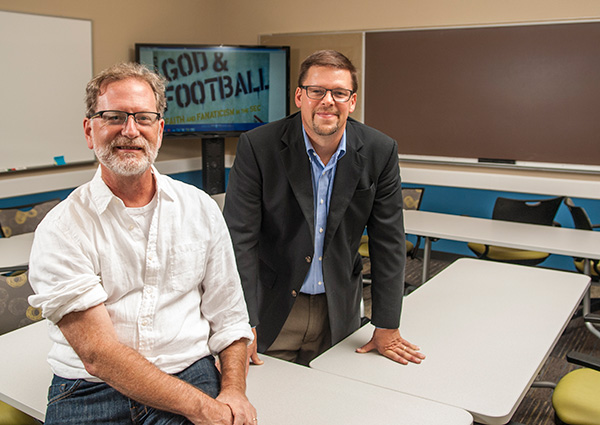Presbyterian College’s “First Year Experience” seminars create a liberal arts foundation

Photo of Dr. Terry Barr (left) and Dr. Michael Nelson (right)
Presbyterian College is committed to a strong liberal arts curriculum that develops critical thinking skills across disciplines. One of the ways that the college introduces students to the liberal arts and the social, vocational, and academic skills needed to adapt to the PC community is through its “First Year Experience” seminars.
“First Year Experience courses are designed to help students transition to college—to help them learn some basic skills, to introduce them to critical thinking,” said Dr. Michael Nelson, professor of history. “It’s also a way to recognize that life is a journey and that students are at PC, a liberal arts college, and we don’t necessarily know what the dominant profession will be in 20 years, but we know the skill set that we know will be necessary, and we know the fundamental knowledge.”
Incoming students can take courses such as “Life as a Freshman,” “You are What You Eat,” and “Socrates Was Right.” These courses provide students with a one-hour credit seminar that assists in the transition to college life.
“We take this kind of unique topic, and it’s not really the content we teach,” said Nelson who teaches “The Religion of SEC Football” with Dr. Terry Barr, professor of English. “We take college football and this craziness that surrounds it, and use it as a vehicle to begin this reflection process. It’s not really about football, it’s about these deeper questions we face.”
“The Religion of SEC Football,” the football class works to help students think more critically about their individual lives and actions. At the same time, Nelson and Barr work to acclimate freshmen students to the academic challenges they will be expected to face when receiving a PC education. They do this through a series of reflective papers and requiring high participation levels from students in the class. Through these assignments, students receive feedback on oral and written communication.
“This is an introduction to the academic rigor you are going to experience at Presbyterian College, and it’s done in a way that we take an interesting topic, you get an interdisciplinary look at it from multiple professors who essentially use this as a way to assist in your transition and assure your academic success,” Nelson said. “The other thing we do is we dedicate time where we simply ask, ‘I want to know your concerns.’ It’s not just about the class or the PC experience, it’s what we can do for the students.”
Presbyterian College is located on a striking 240-acre campus in Clinton, between Columbia and Greenville, S.C. Offering challenging academics and a culture of honor, ethics, and service that prepares students to be leaders in communities, PC offers its students the benefit of engaging with an exceptional faculty who take individual interest in their students’ well-being, both personally and in the classroom. The Presbyterian College School of Pharmacy opened in 2010, and is dedicated to the ideals of leadership, honor to the profession, and service to the community. For more information about Presbyterian College, visit www.presby.edu.
